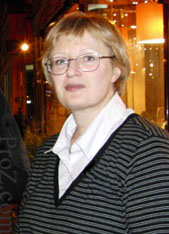Does English society need sworn translators? Thread poster: majkam
|
|---|
majkam
Local time: 08:59
English to Polish
I am going to write a thesis devoted to sworn translators in my country. It seems that that institution exists in the majority of European countries (unlike in the UK). Do you think that British autorities should better introduce it instead of relying on various, independent bodies e.g. IOL that issue a number of certificates.
In Poland, for example, sworn translators both translate and interpret for courts, police stations and private employers and whatever they seal, it becomes a legall... See more I am going to write a thesis devoted to sworn translators in my country. It seems that that institution exists in the majority of European countries (unlike in the UK). Do you think that British autorities should better introduce it instead of relying on various, independent bodies e.g. IOL that issue a number of certificates.
In Poland, for example, sworn translators both translate and interpret for courts, police stations and private employers and whatever they seal, it becomes a legally valid document.
Thanks for any help in advance... ▲ Collapse
| | | | Natalie 
Poland
Local time: 08:59
Member (2002)
English to Russian
+ ...
MODERATOR SITE LOCALIZER | Moving the topic... | Dec 16, 2004 |
...to the Business issues forum
| | | | Magda Dziadosz 
Poland
Local time: 08:59
Member (2004)
English to Polish
+ ...
| The legacy system....not sure if it's worth recommending ;)) | Dec 16, 2004 |
I can't comment what would be better for British society, however, since you are mentioning the system existing in Poland, you probably know that this system is highly criticised, mainly because of the fact that there is no independent body awarding certificates.
The relevant legislation was actually amended a few weeks ago, but it still doesn't seem to completely satisfy the profession. I don't know all the details of the new system in place and of course, it will take time before ... See more I can't comment what would be better for British society, however, since you are mentioning the system existing in Poland, you probably know that this system is highly criticised, mainly because of the fact that there is no independent body awarding certificates.
The relevant legislation was actually amended a few weeks ago, but it still doesn't seem to completely satisfy the profession. I don't know all the details of the new system in place and of course, it will take time before it will be fully implemented, but some of the recognised weeknesses of the old system were that it didn't distinguish between translators and interpreters (sworn translators have been requested to interpret as well); there was no independent body and independent method to test the abilities of a candidate, also the standards have not been applied nationwidely, basically every court would decide differently whom they would accept as a sworn translator and whom they don't (I guess this is something which the new legislation changes). Also, the rates for sworn translators are set by the Minister of Justice, usually on the level 2-3 times below market rates plus translators are not allowed to refuse if the court or police is requesting their services- not a good thing for translators!
You will find more info about it on a website of TEPIS - Polish Society of Legal, Economic and Court Translators.
Best,
Magda ▲ Collapse
| | | | majkam
Local time: 08:59
English to Polish
TOPIC STARTER
Thanks for your reply.
I have to admit that I can agree with you only partially. You are right saying that the old system for recognition of sworn translation was severyly criticized; and that it was by no means flawless. Fortunately, this won't be the case anymore probably. As you said, there has been a new bill issued recently. According to the new law "public translators" (the name altered from sworn tr.) will not be controlled by the Ministry of Justice; there won't be fixed rates for ... See more Thanks for your reply.
I have to admit that I can agree with you only partially. You are right saying that the old system for recognition of sworn translation was severyly criticized; and that it was by no means flawless. Fortunately, this won't be the case anymore probably. As you said, there has been a new bill issued recently. According to the new law "public translators" (the name altered from sworn tr.) will not be controlled by the Ministry of Justice; there won't be fixed rates for their assignments to mention just 2 changes that will be introduced. Actually, Tepis gave a positive feedback. They even claim that the new law was recognised as a good development at an international level...
I just didn't want to mention all that and go into too much detail when placing my question here previously.
I just wanted to know what is the general attitude towards the English system of recognition of public service translators/interpreters..
By the way, do you work as an interpreter/ translator in the UK; do you have any official certificate? ▲ Collapse
| | |
|
|
|
| In my opinion definitely yes! | Dec 20, 2004 |
Living and working in Denmark, I see how the Danish system works - or doesn't always work!
It was set up at a time when there were not many ways of getting the necessary training, so to become what is called a State Authorised translator one has to take an MA at one of two business universities. This MA now has several 'profiles' and variations, and some are offered by other universities, but only one is acknowledged for state authorisation. In practice foreign qualifications are ve... See more Living and working in Denmark, I see how the Danish system works - or doesn't always work!
It was set up at a time when there were not many ways of getting the necessary training, so to become what is called a State Authorised translator one has to take an MA at one of two business universities. This MA now has several 'profiles' and variations, and some are offered by other universities, but only one is acknowledged for state authorisation. In practice foreign qualifications are very rarely if ever accepted, and in fact this is an area where foreigners can compete on equal terms with Danes. (State Authorised Translators are allowed to translate into Danish from their foreign language or into their foreign language from Danish.)
In principle it is a very good system - anyone may buy a dictionary and set up business as a translator (an 'oversaetter' in Danish), but if clients want to be sure, they can go to a State Authorised 'translatoer' - which is a protected title, held only by well-qualified translators.
The only problem is that a lot of highly competent people are not officially qualified for state authorisation. This applies to both Danes and people with foreign qualifications, which may be extremely relevant to translation! In fact I proofread or do translations into English for Translatoerer, who then approve and stamp them, but I am not allowed to be state authorised myself.
However, the situation is about to be reviewed, and I hope there will be more focus on people’s actual competence and not on their exam certificates alone.
In both Denmark (where nearly all communications with other countries have to be translated) and in England, where the country's language is more or less global, many people are forced to translate from and into English when they want to communicate with the rest of the world. Lots of people can do it more or less, but not all of them are aware of the problems and cultural differences.
Simply because 'everyone speaks English' it is very necessary to distinguish properly qualified linguists from people who have picked up some of the language along the way and may be good in some situations, but don't know their own limitations.
A trained linguist should also know when to say 'sorry, this is not my field,' and send the client to someone else. That is why I am looking forward to when the Institute of Linguists gains its charter - and can then authorise its members as translators, interpreters etc. as appropriate.
It is important to mark out the professionals from the amateurs, who may be good, but should then apply for authorisation.
I wrote about this in The Linguist, Vol. 41 no. 5, October-November 2002, Letters.
All the best
Christine Andersen, MIL
PS
A code of conduct protects both clients and translators by setting out rules for confidentiality and professional secrecy and other ethical questions. Immaterial property rights and copyright are relevant issues here.
[Edited at 2004-12-20 17:23] ▲ Collapse
| | | | To report site rules violations or get help, contact a site moderator: You can also contact site staff by submitting a support request » Does English society need sworn translators? | Trados Business Manager Lite | Create customer quotes and invoices from within Trados Studio
Trados Business Manager Lite helps to simplify and speed up some of the daily tasks, such as invoicing and reporting, associated with running your freelance translation business.
More info » |
| | Trados Studio 2022 Freelance | The leading translation software used by over 270,000 translators.
Designed with your feedback in mind, Trados Studio 2022 delivers an unrivalled, powerful desktop
and cloud solution, empowering you to work in the most efficient and cost-effective way.
More info » |
|
| | | | X Sign in to your ProZ.com account... | | | | | |







